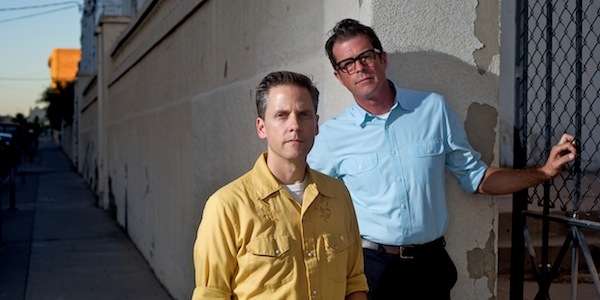“We’ve been playing together for such a long time that we really enjoy watching each other have a great time on stage,” Burns says. “We love playing with each other and playing with the crowd in equal measures.”
The confidence seems to come from a place of contentment. While Calexico have always pushed the boundaries of orchestration and instrumentation, there have been times when experimentation has come at a cost. When you’re a thinking man’s band, ensuring the audience is never isolated is paramount and the cure for any prospective inaccessibility is finding the right sound. “After years of trying to find that optimal sound – similar to what you try to do in the studio as well – when you try to find that sound in the live space, you get to feel that energy that transcends everything around you and you get to finally enjoy it completely.”
It’s truly a sign of contentment when a band is enjoying each other as much as the crowd is enjoying the gig. So often artists can’t even stand to listen to their own music let alone allow themselves to have true, uninhibited fun on stage. They rattle off clichéd lines to the crowd, they tell the story that has gotten a laugh for the past 30 shows and they do anything and everything bar have fun. Performing, playing a role or creating a character for the live environment is vital for some artists but the music of Calexico has always lent itself to vulnerability and open-palmed honesty. It’s the key to their success so far and it’s growth is a testament to their passion.
“Last year we were playing in Paris and it was one of those super-hot and sweaty clubs and we were like ‘Alright let’s just try and do our best’ and once I got over that threshold of ‘This is going to be so uncomfortable’ it felt so good to be in that environment,” he says. “We were all together, all sweating, all feeling the same thing. I was seeing people up in the balconies fanning themselves and it made me feel like that is what it must’ve been 100 years ago when people played music. It opened me up and I was suddenly improvising a lot which the band told me they really enjoyed. Those are the moments where you lose yourself and those are the moments that make it all so special.”
Burns continues discussing the notion of artistic authenticity and his own moment of realization. “There was a writer here is Tucson, Arizona who in his time had met Henry Miller and John Steinbeck at UCLA when they were doing research for their writing,” he says. “At the time I met him my grandfather had passed away and he was this older influence and he said to me ‘You can’t fake it’ – in this 80-year-old voice. It’s so true because every time you try it leaves everyone feeling cold. I think that is the spirit of what makes up our band.”
Last year’s release, Algiers, was famously recorded in New Orleans – the first Calexico album in many years not recorded at their WaveLab Studio in Tucson. “I don’t care if that’s total lo fidelity or all of the best technology it has to have soul; whatever it takes to get the best possible story is all that matters,” he says. “We travel both inside and outside of ourselves to do that and it’s challenging. It evokes change and it evokes emotion and it challenges the spiritual make up of who we are – the really good and the really bad – so while I try not to let too many filters in but we are very open to whatever it takes to get that sound.”
Part of what it takes is substituting ego for servitude – so many band’s fail to realise that it doesn’t matter how well you play your instrument or how many notes you can squeeze into a syncopated rhythm, if it doesn’t serve the song no one will care. “It’s incredible how much restraint these six or seven band members can show when we play live and when that’s needed,” he says. “They might be playing just one or two things and just waiting until that moment when things build and that’s what makes our sound so special … It’s something I saw a lot playing in jazz groups in high school and classical groups in college; it was fun to be restrained and to serve the song as well as be able to listen to what is being created. The rising and falling of energy is what brings so much joy to people on both sides of a gig.”
BY KRISS WEISS

